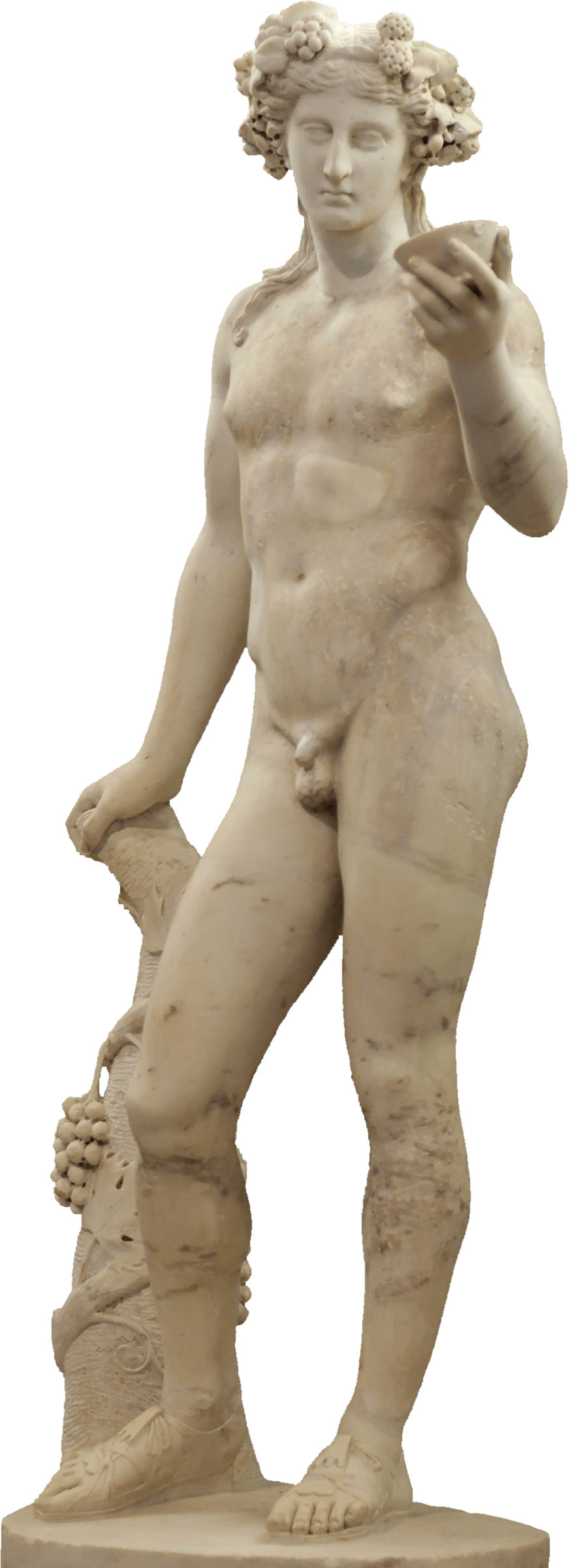Wine in Religion
Dionysus the White God of Wine
Wine cannot be compared to any other drink.
It has in its ancestral roots and above all a deep meaning in religions and the theater .
Dionysus
Son of Zeus and Semele from whom he takes his attributes from God and the ability to stimulate the passion of women.
As Harmonía's grandson, he is the representative of harmony and harmony. From his grandfather Cadmus inherits the attributes of the plow, agriculture and the smelting of metals.
As Aphrodite's great-grandson, he acquires the beauty of a handsome man, an inciter of erotic and sexual love.


However, and although we want to reduce Dionysus to a simple drunken orgy instigator, as we are intended to make him see.
Dionysus and wine had a ritual character, a transcendent sense, since it was a way of connecting with God, with the divine part that each one has, and wine was the means to reach this.
The Egyptians were one of the first to produce wine and it was only intended for the pharaohs, the people were given beer.


If Dionysus was the son of Persephone, there was also the link with agriculture and fertility, attributes that he could have inherited from his grandmother Demeter.
In mythology it is said that once Demeter neglected the land to go looking for her daughter, so the land froze, became arid and went hungry, this was called: "The first winter", but in spring He returned in the company of his daughter.
Hence, the bacchanalia were celebrated in spring, since they were associated with harvest and sex. These rituals are predecessors of carnival (which in vulgar Latin means; abandon the meat).
The Bacchanals
In Rome, the spring rituals of Dionysus, known in Rome as Bacchus, are inherited from Greek culture.
The early rituals were secret and performed by priestesses or Bacchantes, It was a ritual dedicated to the land, so it was only for women. This cult came from the original cult of the god Pan.
In the grove of Simila, near Mount Aventine, they gathered for the celebration on March 16 and 17. In that place an altar was raised, which they decorated with bread, fruits of the earth and much wine.
The Bacchantes got drunk on wine, until one of them could connect with that spiritual part of nature to give them a prophecy and find out what the next year held for them.
The ritual was a celebration where there was music, dance and the staging of the gods who participated in the ritual was performed to remember their deeds and deeds.
The young Bacchantes novices represented the nymphs of the forest, chased by a playful faun, the God of Bread to the sound of the syrinx or pan flute.
The prohibition of the Bacchanalia
But the Bacchanalia continued to be celebrated and, given the impossibility of preventing their women from getting drunk, they began to meddle in the ritual, disguised as fauns with masks, they ended up drunk and participating in long orgies.

The myth spread
According to mythology, the ancient Titans lured little Dionysus with shiny toys to kill him. It was quartered, cooked and eaten. Zeus notices and strikes the Titans with his lightning, but since Dionysus's heart had not been devoured, he was able to resurrect it.
From the ashes of the Titans and the earth, humans emerge, with a titanic component and another Dionysian, dragging some of the guilt of the death of the God, so they must be purified avoiding spilling the blood of men and animals, so that in the end of its existence, its soul is liberated from the body and returns to the divine world from which it came.
According to Herodotus, Zeus brings the resurrected Dionysus to Nyssa to take care of him in the lands of Ethiopia, beyond Egypt.
Other Greek sources say that the myth came from Anatolia or Arabia according to Diodorus Siculus. But there is more, it can be believed that the cult, with another name, could have come from Minoan Crete. However, the cult or part of it was integrated into primitive Gnosticism.
Be that as it may, this pagan cult was ritualized in the form of theater , where the gods, satyrs, nymphs and silenos (drunkards) were interpreted, wine was drunk and orgies were held.
Catholicism in its beginnings forbade it, because according to this it made men foolish and happy, making them irresponsible for their duties. As it was a feminine ritual driven by women, it was these that were attacked as provocateurs and witches.
But as always, when something is repressed it is when it is least respected, so seeing that it was not possible to stop it, Catholicism integrated it into its cult at Mass, changing some elements that survive to date.
Wine is a spiritual and transubstantiation element, which has transcended ideas, cults and religions, that is why wine is not like any other drink.


















